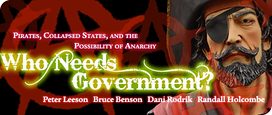Randy says that “that path” I “advocate toward anarchy sounds like Reagan Republicanism.” I must admit, I’m completely befuddled by this remark.
On the one hand, I don’t know what is “Reagan Republican” about saying that government should not exist. And on the other, I have not, at least to my knowledge, suggested any “path toward anarchy” whatsoever. I have said that where anarchy already exists (Somalia) that it should be left alone. But this is hardly a proactive policy guide to achieving statelessness.
The only comment in my last post related to the question of how we might achieve anarchy where it does not exist was a purely negative one—to point out that I do not believe foreign governments could successfully “impose” anarchy on the developing world.
Incidentally, even if one were to mistakenly interpret this statement as policy guide to proactively achieving anarchy where it does not exist, there would be nothing “Reagan Republican” about it. Regan’s foreign policy was predicated on the use of military intervention to achieve the political and economic outcomes his administration was after in foreign countries. I am advocating precisely the opposite—that no such intervention would be desirable.
With regard to the U.S., I have only argued that: (a) I believe anarchy would be desirable for the U.S. (my last post), (b) that we are not as far from anarchy as many people think (my last post), and (c) that I am in agreement with Randy that one of the big stumbling blocks to “implementing” anarchy is that people tend to think that only the government is capable of supplying particular goods (a previous post.)
Outside of suggesting with respect to (c) that it may be useful to present arguments that demonstrate the effectiveness of markets in supplying such goods I have not said anything that could be construed as identifying steps we could take to achieving anarchy in the U.S. Nor will I attempt to suggest how we might do this here. This is not because I do not think it is an important question. It is because I am not a political strategist, and this question of the political expediency of anarchy is really a question of political strategy.
The only comment I made about “government shrinking” was in the context of talking about potential paths the U.S. might have taken in the early 19th century that would have generated prosperity. My point here was not about identifying a practical path to achieving anarchy. It was simply that had America gone the way of anarchy (which would have required government to shrink eventually to zero, rather than growing as it did), America easily could have turned out no worse off, and very likely better off, than it did. I was using this example simply to say that government in the U.S. is one, but not the only, political-economic arrangement consistent with American prosperity. I did not have in mind, nor was I trying to suggest, anything like a politically-expedient “path to anarchy.”
I hope that helps to clarify my (essentially non-)stance on this issue of the political expediency of anarchy.

